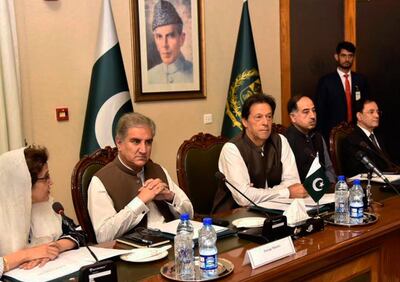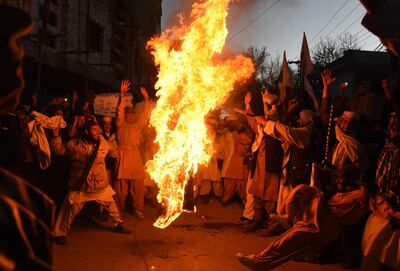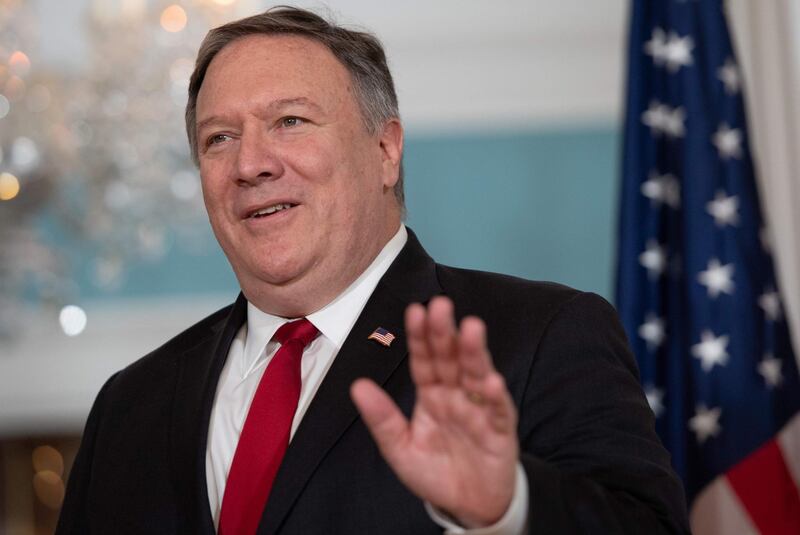The telephone call should have been a diplomatic formality between allies, centered on a message of congratulations for Imran Khan on his appointment as prime minister.
Instead last month's communication from Secretary of State Mike Pompeo set off another spat between America and Pakistan and served only to underline their prickly relations.
The uneasy allies could afterwards not even agree on what was discussed, while some saw the failure of Donald Trump to speak himself to his fellow leader as a deliberate slight of protocol.
It is against this unfortunate backdrop that Mr Pompeo and the top US military officer, Gen Joseph Dunford, will stop in Islamabad on Wednesday en route to Pakistan's arch-rival, India.
American officials see the visit as an attempt to gain much needed cooperation in Afghanistan at a time when violence is escalating and Mr Trump's year-old South Asia strategy is making little headway against the Taliban.
The US president boosted American troop numbers to about 14,000 last year, saying he would loosen restrictions on commanders and let them "fight to win". Yet the Afghan forces they are training have failed to strengthen Kabul's grip on the country and ISIS remains stubbornly dug into eastern Afghanistan.
Jim Mattis, the US defence secretary, has said combating militants will be a primary part of discussions in Islamabad.
Mr Khan, whose political rise was sped by regular outbursts of anti-American rhetoric, has said he wants to forge a more equal partnership.
Tensions will not have been helped by the Pentagon's announcement on Saturday that America was cancelling $300m of military aid.

The decision to formally reassign the money – frozen earlier in the year – was a reprisal for what the US said was a lack of decisive actions by Pakistan in stopping alleged support for Taliban militants in Afghanistan.
The US has long accused Pakistan, and particularly its military spy agency, of supporting the Taliban and a militant grouping known as the Haqqani network, to increase influence in Afghanistan.
"I think [America] is absolutely furious that Pakistan has not acted more decisively in taking on terrorist groups which are seen to be scuppering a peace settlement in Afghanistan," said Dr Farzana Shaikh, a Pakistan specialist at the Chatham House think tank.
In his first tweet of the year, Mr Trump criticised Pakistan's "lies and deceit", saying it had received billions of dollars of aid and had still failed to act against its alleged militant proxies.
Mr Trump's failure to pick up the phone himself to congratulate the new leader of the world's fifth most populous nation was another sign of disapproval, said Dr Shaikh.
"The message is clear, that President Trump simply cannot be bothered to pick up the phone and congratulate Prime Minister Khan.
"This is intended to send out a deliberate message to Pakistan and its new leadership," she said.
____________
Read more:
Pakistan disputes US account of Khan and Pompeo call
Pakistan recruits thousands more troops to guard Afghan border
____________
America said after the telephone call that Mr Pompeo had raised the importance of Prime Minister Khan "taking decisive action against all terrorists operating in Pakistan".
Islamabad bristled, calling the US account factually inaccurate and demanding it be immediately corrected.
Yet despite the mistrust and recriminations, Dr Shaikh said both countries knew the relationship could not be allowed to founder.

If Pakistan is to apply for an International Monetary Fund bailout to ease its dire finances, it must court Washington which holds the lion's share of IMF decision-making votes.
Pakistan meanwhile remains as critical as ever to any solution to the US's longest-running war. President Ashraf Ghani's government in Kabul continues to lose ground against a Taliban insurgency. Mr Trump's administration has set its hopes on a peace settlement.
"As far as the United States is concerned I think it's an open secret that any significant shift to a peace settlement in Afghanistan will depend on Pakistan's cooperation.
"The United States, despite President Trump's rather disparaging remarks about Pakistan, understands this," added Dr Shaikh
Yet in an era of diplomacy by Twitter, any attempt to rebuild the friendship is always a tweet from disaster.
"I don't see the relationship coming out of the woods in any foreseeable future given the predilection of the Trump administration is to conduct its diplomacy via the media and tweets, that can cause a fair amount of offence in Pakistan,” said Sherry Rehman, a senator and former Pakistani ambassador to Washington.
The fragility of President Ghani's government mean the hard practicalities of Afghan security are likely to dominate discussions behind closed doors, she said.
"Mood and tone will count for a lot more generally than it does elsewhere, because there's always a certain level of ice to be broken between the two countries."





